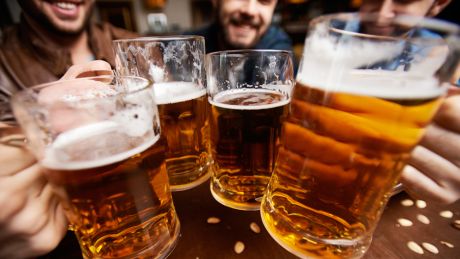How to Get Rid of Your Beer Belly (Without Giving up Pints)
It’s not just the booze contributing to your beer belly, it’s how you approach drinking alcohol

Sign up for workout ideas, training advice, reviews of the latest gear and more.
You are now subscribed
Your newsletter sign-up was successful
Nothing quenches a thirst quite like an ice-cold beer, especially after a big-game win or a particularly long and sweaty workout. And because lager contains both energy-replacing carbohydrates and hydration-helping electrolytes, many a wishful drinker has justified toasting a hard session with a couple of pints. But just how damaging is booze towards you achieving your goal of shedding excess body fat? Read on as we separate the booze facts from the fiction.
RECOMMENDED: How to Lose Belly Fat
Myth: The Calories In Alcohol Are Making You Fat
Nope – they’re not the problem. Alcohol is second only to fat when it comes to calories per gram, but focusing on alcohol’s calorie content is flawed logic. The 190 calories or so in a pint simply don’t affect your body in the same way as eating a glazed doughnut with the same calorie count. Also, alcohol has a thermic effect that means you burn around 1.5 of every 7 calories it contains just by digesting it.
On top of that, according to the American Journal Of Clinical Nutrition’s research, the liver converts the majority of alcohol we consume to acetate, meaning most of its calories don’t even get a chance to be used as energy or stored as fat. Stick to moderate drinking so your liver stays healthy, but don’t expect your belly to reduce in line with your unit intake. It’s the food you eat when you’ve been drinking that’s really responsible for those extra belt holes.
For the best chance of swapping a beer belly for washboard abs, don’t worry about calories in your drinks – look at the carb content instead as that’s what will be stored as fat. Steer clear of beer (10-20g per pint) after a couple. Go for wines or spirits with diet mixers, preferably soda water and fresh lime.
Myth: You Have To Give Up Alcohol To Be In Optimum Shape
The good news is you can still drink (in moderation), as long as you watch what you eat. Research published in the American Journal Of Clinical Nutrition found that one of the main reasons regular boozing results in a beer belly is that as soon as you drink a drop of alcohol, the body – like most of us – prioritises that over everything else. This means alcohol jumps to the front of the metabolism queue like the rude molecule it (probably) is. So not only does that late-night kebab have a whole day’s fat and carb intake, it will also be metabolised slowly and inefficiently by a digestive system that’s essentially as drunk as you are.
RECOMMENDED: How Many Calories in a Kebab?
Sign up for workout ideas, training advice, reviews of the latest gear and more.
To avoid this problem, prepare your body by reducing your fat and carb intake on drinking days. Eat as many vegetables and as much protein as you like, going for lean sources. The protein and fibre should keep you full, decreasing the chances of that desire for a kebab rising in the first place.
RECOMMENDED: High-Protein Foods
Myth: Alcohol Makes You Hungry
Actually, it makes you greedy. The main reason we pile junk food into our faces when we’re pissed is because we want to. Alcohol reduces inhibitions, which is why you might suddenly be able to talk to that person you’d never normally have the nerve to approach. It’s also why you would happily borrow 20p off someone in the bus queue to get fried chicken on the way home. The willpower that stops us from mainlining Mars bars from the minute we wake up is mostly absent when we’re drunk, and that’s what’s to blame for those munchies.
Make sure you’ve eaten well throughout the day (lean protein and veg for the win) and are feeling full when you arrive at the pub. If you’re tempted to eat more, remind yourself you aren’t actually hungry, just being greedy. Use those broken-down inhibitions to strike up a chat with someone instead of hoovering up a nosebag of chips.
Lastly, make sure you’ve got a healthy snack ready for when you get home. Something like beef jerky is good because it’s low in fat, high in protein and has all the salty deliciousness your tipsy taste buds want. Oven pizza with extra cheese plus a small piece of your fingertip from that damned grater? Terrible choice.
Myth: Alcohol Helps You Get To Sleep
One of the best things you can do to start shrinking your belly is get more sleep, because a consistent lack of shut-eye ramps up stress levels, which makes your body more likely to start storing fat instead of burning it. So a couple of drinks before bed is a smart move to get to sleep faster, right?
Wrong. You might find a drink sends you to the land of nod quickly, but booze before bed isn’t a good way to get a good night’s rest because of how alcohol affects brain activity, according to research in the journal Alcoholism: Clinical & Experimental Research. Subjects who drank just before bed had more slow wave sleep patterns – called delta activity – which is the period of deeper sleep that’s associated with restoration. So far, so good. But they also had heightened alpha wave patterns, which your brain typically displays when you are awake. The competition between alpha and delta waves disrupts sleep, which is why you’ll often wake up still feeling tired even if you just had a single drink before bed. Horlicks, anyone?
Max was the head of digital content for Men's Fitness which worked alongside Coach between 2015 and 2019.

